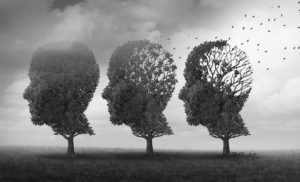By Peggy Benzing, D.O.
 Alzheimer’s Disease touches people regardless of race, gender or religion. Currently, there is no predicting who will be affected, and there is no reliable treatment. It robs people of their memories and progresses throughout its course until the patient is no longer able to be managed at home.
Alzheimer’s Disease touches people regardless of race, gender or religion. Currently, there is no predicting who will be affected, and there is no reliable treatment. It robs people of their memories and progresses throughout its course until the patient is no longer able to be managed at home.
Frequently, an older couple has been living together and relying on each other for decades. Although it happens gradually, usually one half of the couple becomes the “caregiver” and one becomes the “cared for”.
Early in the disease, small memory lapses are usually compensated for, and the caregiver slowly takes on the responsibility for activities of daily living, such as shopping, cooking and driving. However, as the disease progresses, the patient is less and less able to make decisions or care for themselves. This places a significant burden on the caregiver. In later stages, the affected patient can have hallucinations causing anxiety, and even accuses the person who loves them the most of having bad intentions. They tend to have problems with wandering and can be injured without careful supervision They have difficulty sleeping; indeed, the worst paranoia and hallucinations occur in the evening and at night.
Periodically, they will lash out at and unintentionally injure the caregiver, who is unable to defend themselves. When it becomes too difficult for the caregiver to continue, the patient is often institutionalized. Alzheimer’s patients, frequently lose their appetites. When people lack proper nutrition, other problems are sure to arise.
I would like to discuss Medical Marijuana as it relates to modification of behavioral disturbances in the dementia patient. I am not suggesting that cannabis can cure Alzheimer’s disease. What I am suggesting, is that this incredibly safe substance can be utilized to lessen the outbursts and hallucinations which are often the precipitating factors that lead to them being removed from their homes “for their own safety” or the safety of the caregiver. If we can help the patients sleep, they will wander less in the night. If we can improve their appetite, they will be healthier in general, and less susceptible to disorders that occur with poor nutrition.
At this time, there are no effective treatments for Alzheimer’s Disease, but there are several ongoing studies regarding slowing the progression of the disease, and especially controlling the behavioral symptoms. It is possible that marijuana based products will be more helpful in moderating the symptoms that make it difficult for the caregiver to manage the patients at home.
In December, 2018, Minnesota joined 13 other states in adding Alzheimer’s Disease to the list of conditions for which people can qualify for medical marijuana. While Florida doesn’t specifically list Alzheimer’s Disease, many of the symptoms qualify as treatable conditions.
Since we know that we heal most effectively while we sleep, it is important to note that the negative effects of insomnia on the Alzheimer’s patient, as well as the effects of that insomnia on their caregiver.
A preclinical trial reported in September, 2014, in the “Journal of Alzheimer’s” showed that THC, one of the chemicals in marijuana, at low doses, could be a potential therapeutic treatment option for Alzheimer’s Disease, through multiple functions and pathways. It was found to slow the progression of beta-amyloid proteins, which are felt to be a key contributor to the progression of Alzheimer’s. Another study, published June, 2016, in the “Salk News” has found preliminary evidence that THC can promote the cellular removal of amyloid-beta.
There is a trial in progress in the United Kingdom that is studying Sativex, a drug containing both THC and CBD, and its effects on 60 patients who are living in care homes for the trial. The study is specifically watching for changes in aggression and agitation.
A recent study by Dr. Kristin Lanctot, PhD, examined the effects of Nabilone, a synthetic cannabinoid (cannabinoids are chemicals found in marijuana) and its effects on disruptive behaviors in dementia patients. The study found that Nabilone reduced agitation compared to placebo and it also improved behavioral symptoms overall. The most common side effect was sedation.
The medications we use to manage the symptoms of Alzheimer’s Disease are poorly effective, and neither are they completely safe. Tranquilizers and antipsychotics have the potential for disastrous side effects. Marijuana has been found to be completely safe and does not cause heart, lung, liver, kidney, intestinal or any organ failure. It does not make people stop breathing or fall down. It may be the safest, most effective way to keep patients in their homes longer.
If you or a loved one would like to be evaluated for the possible benefits of treatment with medical marijuana, please contact us at Liberate Physicians Centers, either in Port Charlotte or Venice.
Liberate SWFL in Port Charlotte
(941-888-3232)
Liberate Physicians of Venice
(941-244-4100)









